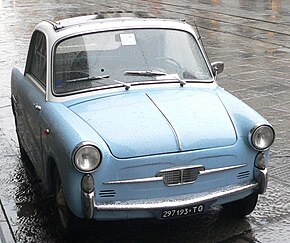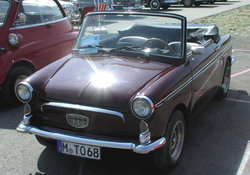Difference between revisions of "Autobianchi Bianchina"
m |
m |
||
| Line 8: | Line 8: | ||
[[Image:autobianchi.jpg|center|100px]] | [[Image:autobianchi.jpg|center|100px]] | ||
| − | [[image:Autobianchi_Bianchina.jpg|right|thumb|290px|'''Autobianchi Bianchina at [http://www.woiow.com link Wheels Of Italy''']] | + | [[image:Autobianchi_Bianchina.jpg|right|thumb|290px|'''Autobianchi Bianchina at [http://www.woiow.com link Wheels Of Italy''']]] |
[[Image:Bianchina1.jpg|thumb|290px|''Bianchina Trasformabile Special'', in [[Turin]], [[Italy]]. <br>Photo:Egil Kvaleberg]] | [[Image:Bianchina1.jpg|thumb|290px|''Bianchina Trasformabile Special'', in [[Turin]], [[Italy]]. <br>Photo:Egil Kvaleberg]] | ||
Revision as of 22:53, 10 November 2009
| Autobianchi Bianchina |
|---|

The Bianchina is an automobile produced by Italian automaker Autobianchi, based on the Fiat 500 mechanicals. It was available in various configurations, Berlina (saloon), Cabriolet (roadster), Trasformabile (convertible), Panoramica (station wagon), and Furgoncino (van). The car was presented to the public on September 16, 1957 at the Museum of Science and Technology in Milan.
Initially the car was equipped with the smallest Fiat engine, air-cooled 479 cc producing 15hp. In 1959 the engine power was increased to 17hp and 1960 was launched cabriolet version.
In the same year Trasformabile, which engine cylinder capacity was increased to 499 cc (18 hp) was made available in Special version with bicolour painting and engine enhanced to 21hp.
In 1962 the Trasformabile was replaced by 4-seat saloon. The engine and chassis were the same as in Trasformabile.
In 1965 was made minor facelift.
In 1970 Bianchina went out of production, replaced by the more modern A112.
Production

The Bianchina was produced from 1957 to 1970 in a total volume of approx 275,000. From 1970 to 1977 the model name was Giardinera, which only existed in station wagon and van variations.
| Model | Years produced | Power (BHP) | Capacity (cm³) | Production |
|---|---|---|---|---|
| Trasformabile series 1 | 1957-1958 | 15 | 479 | 17,000 |
| Trasformabile series 2 | 1959-1960 | 16,5 | 479 | 10,000 |
| Trasformabile series 3 | 1961-1962 | 17,5 | 499 | 7,000 |
| Trasformabile Special | 1959-1962 | 21 | 499 | 1,500 |
| Cabriolet series 1 | 1960 | 21 | 499 | 1,050 |
| Cabriolet series 2 D | 1961-1964 | 21 | 499 | 5,500 |
| Cabriolet series 3 F | 1965-1969 | 21 | 499 | 2,750 |
| Berlina 4 door D | 1962-1964 | 17.5 | 499 | 26,500 |
| Berlina 4 door F | 1965-1969 | 18 | 499 | 33,500 |
| Berlina Special D | 1962-1964 | 21 | 499 | 4,000 |
| Berlina Special F | 1965-1969 | 21 | 499 | 5,000 |
| Panoramica D | 1960-1964 | 17.5 | 499 | 75,000 |
| Panoramica F | 1965-1969 | 17.5 | 499 | 85,000 |
| Panoramica sun roof | 1960-1969 | 17.5 | 499 | |
| Furgoncino van, low roof | 1965-1970 | 17.5 | 499 | |
| Furgonetta van, tall roof | 1970-1977 | 17.5 | 499 | |
| Giardiniera wagon | 1970-1977 | 17.5 | 499 | |
| Giardiniera Furgoncino van | 1970-1977 | 17.5 | 499 |
Source: Club Bianchina and Bianchina Classic Club
Trivia
George Lucas was given a Bianchina by his father, which Lucas then modified and entered it into races until he was hospitalised after crashing the car on June 12, 1962 on a public road.
Bianchina is the car of the popular italian film character Fantozzi Interpreted by Paolo Villaggio
Also See
External links
| Models - Bianchina | Stellina | Primula | A111 | A112 | Y10 Founding partners - Bianchi | Fiat | Pirelli | ||||
| Parent brand - Lancia A brand of the Fiat group | ||||


